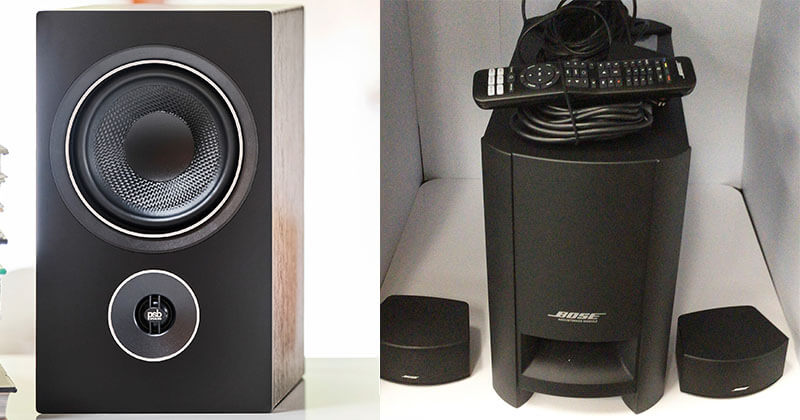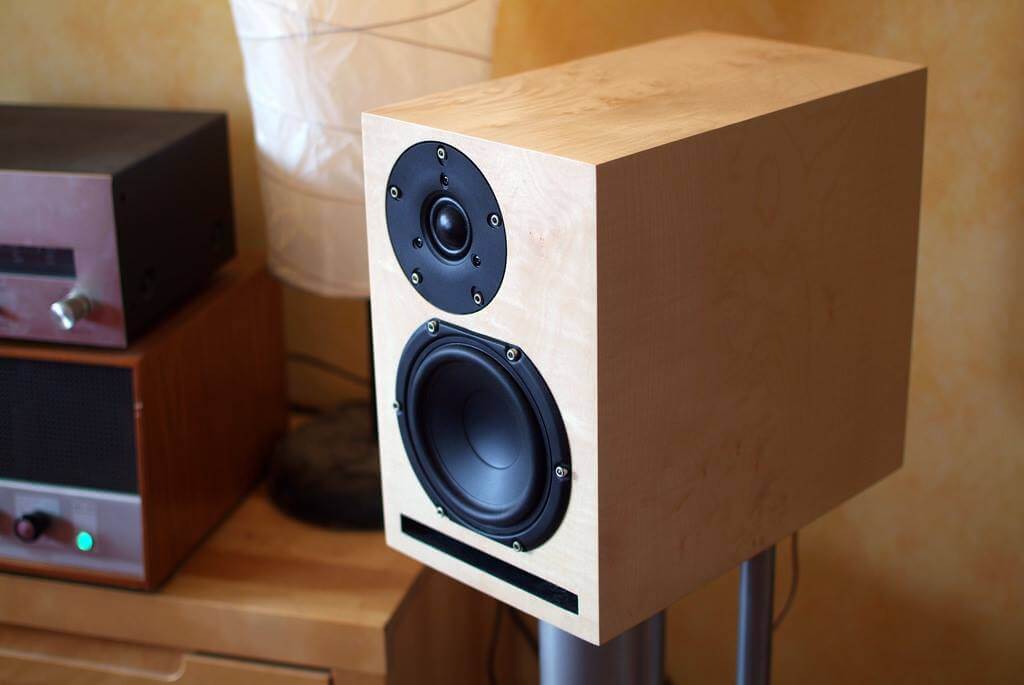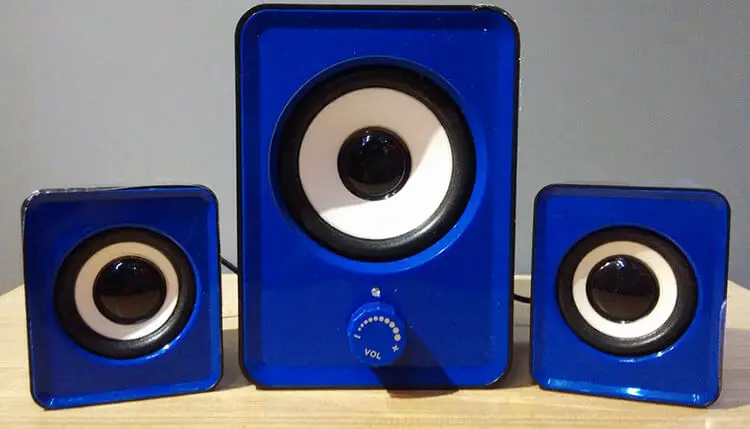You can find various types of speakers in the market. Woofer, soundbar, cube, and tower are some of them. Each of these speakers fulfills different purposes. For example, soundbars are for stereo effects, and cube speakers are for surround effects.
Though each type of speaker has a different purpose, some have similarities too. The same goes for a bookshelf and 2.1 speakers. They have both differences and similarities. So, new users need clarification when choosing one between them. That’s why I have come up with this blog. Here I will compare these 2 types of speakers and explain which one is better.
Overview of Bookshelf vs 2.1 Speakers

Honestly, choosing one from the bookshelf and 2.1 is easy. But it’s only possible when you have a definite purpose.
A 2.1 include 2 small speakers separating the audio channel and a subwoofer as the mainframe. It is also known as computer speakers. As it has a better audio processing unit, it’s popular mostly among PC users who love gaming or video editing. So, computer speakers can be good for you if you are a regular PC user.
Bookshelf speakers come with a comparatively larger driver and a tweeter. They are placed on a bookshelf, table, media console, or speaker stand except on the floor. Thus, it can provide more powerful sound with stereo effects. So, a bookshelf speaker is better if you are an audiophile or hardcore music lover.
If you understand your need, the above information is enough to choose between 2.1 and the bookshelf speaker. Otherwise, follow the below comparison to know which one is better overall.
Ultimate comparison: Bookshelf vs 2.1 Speakers
It’s not always necessary to have a definite purpose. You can look for an option that fulfills various purposes and offer better performance overall. Understanding your concern, I have prepared this comparison. Here, I will compare the bookshelf and 2.1 speakers for multiple factors. Ultimately, I will announce the winner according to the total point they obtain.
| If you don’t have much time to read a detailed comparison, jump into the Comparison Table and take a quick decision. |
Sound Quality (Treble)
Sound quality is a key characteristic of speakers. Each user has their own definition of good sound quality. Some people associate it with power. Whereas clarity and smoothness mean quality to some. That’s why I have split it up into 2 factors. First, let’s talk about the treble.
Treble solely depends on the audio processing capability of the speakers. Bookshelf speakers don’t have a separate audio processing unit. It’s an integrated speaker consisting of a woofer and a tweeter. There is no preamp or amplifier integrated into it. You will need an external amplifier if you want the best outcome from a bookshelf. So, the overall treble amount is decent in a bookshelf speaker.
A 2.1 is basically a spit of a bookshelf speaker. The speaker is divided into 2 channels, and the subwoofer work as a bass module. The subwoofer has an integrated amp. So audio processing is excellent in 2.1 speakers. Moreover, 2.1 speakers can provide surround sound effects. So, the overall amount of treble is higher in 2.1 speakers.
Sound Quality (Bass)

The Bass of a speaker depends on the size of the driver. A 2.1 mostly comes with 2 small size speakers. Besides, the woofer has a comparatively smaller driver. Moreover, the speaker and bass module are separated. That’s why 2.1 produce low-powered sound. So, the amount of bass you get from a 2.1 is decent.
A bookshelf speaker features comparatively larger drivers. Besides, it features a tweeter that can emit high-frequency signals. Moreover, the woofer and tweeter are integrated together. That’s why the sound of a bookshelf speaker is powerful. If you connect it with a suitable amplifier or AVR, the sound will be way more powerful. So, a bookshelf speaker can provide better bass than a 2.1.
Distortion & Noice Resistance
Another parameter of good sound quality is a speaker’s distortion and noise resistance. In a bookshelf speaker, the woofer emits audio signals up to 200 Hz of frequency. The tweeter also emits high-frequency audio signals up to 20 kHz. As the tweeter and woofer are close to each other, two types of waves overlap. As a result, a certain amount of distortion is produced.
The best thing about a 2.1 is that the audio channel and bose module are separated. So, you can place these components wherever you want. That’s why the distortion level is minimum here. Again, 2.1 has an audio processing unit. So, noise is also lower here.
Ease of Use (Space & Setup)
Ease of use depends on many little factors. That’s why I have split it into 2 parts. First, let’s talk about space and setup.
A 2.1 occupies comparatively less space. It’s obvious, as you have to place 3 speakers instead of 1. Setting a 2.1 is also complicated. Like you have to connect the subwoofer to your pc. Then connect the cube speakers to it. Then power the subwoofer. It’s a total mass. Besides, you will need to adjust the volume separately on the speakers and the subwoofer. Otherwise, you won’t get the expected performance.
If you consider a bookshelf speaker, it occupies less space. Besides, it’s easy to set up. Just connect it to the power and source. That’s it. No more connection is necessary. Also, you don’t need to adjust the volume separately from the woofer and tweeter.
Ease of Use (Moveability)

Some audiophiles can’t stay without their speaker. They want to carry the speakers wherever they go. So, moveability is a thing to think about.
A 2.1 is bulky in size and has separated units. So, it’s difficult to transport. Moreover, it’s complicated to set up. You can’t get those setup facilities everywhere. So, a 2.1 has limited moveability.
A bookshelf speaker is smaller in size as all the units are integrated. You may think it’s heavy. But in reality, it’s not that heavy. So, you can transport it outdoors. You can enjoy music at parties, picnics, and tours with a bookshelf speaker. It has an excellent moveability advantage.
Price
It doesn’t matter how much a speaker serves; users always consider the price. The user will never purchase if it can’t offer value for the money. So, the price can be an essential point of comparison. If you compare the bookshelf and 2.1 speakers, a bookshelf can provide a better value for money.
Don’t get me wrong, a 2.1 speaker always seems overpriced. A 2.1 has similar features to a bookshelf speaker. But the manufacturing cost rises for splitting the units. Of course, it’s the best option for a computer. But think from a perspective of an average user. The power and quality of sound a 2.1 provides are not worth that money.
If you consider a bookshelf speaker, it features the same unit as a 2.1 do. But it is cheaper as it comes in an integrated form. Moreover, the sound it produces is better considering the price.
Versatility
For an average user, versatility can be essential when choosing a speaker. Versatility means variety in sound and multiple use cases.
If you consider a 2.1, it is also known as a computer speaker. The name itself explains where it is used. A 2.1 is mainly used for PCs. The surround sound it provides is perfect for gaming or watching movies. If you are an audiophile, it won’t satisfy you. It can’t offer enough power or stereo effect. So, a 2.1 is not suitable for a hardcore music lover.
If you consider a bookshelf speaker, you can’t place it on the floor. But you can put it above the floor wherever you want. So, it can be used for many purposes. You can use it as a computer speaker. Besides, it can be connected to your TV. It provides stereo effects and a lifelike room room-filling sound. So, watching movies is also possible. And, of course, it’s a perfect speaker for music play. You can enjoy music both indoors and outdoors with a bookshelf speaker.
So, regarding versatility, the bookshelf speaker is better than a 2.1.
Side-by-Side Comparison
| Specifications | Bookshelf | 2.1 Speaker |
| Power | High | Low |
| Frequency response | High | Low |
| Amplification | Low | High |
| Noise Reduction | Low | High |
| Setup | Easy | Difficult |
| Weight | Light | Heavy |
| Price | Low | High |
The Winner!
You have already realized that a bookshelf speaker is far better than a 2.1 speaker. A 2.1 also has some advantages. But it’s for a specific use case. If you think overall bookshelf speakers are best. It’s cheap, versatile, and easy to use.
I have compared the 2.1 and the bookshelf speaker based on 7 factors. If you give 1 point for each factor, the 2.1 speaker gets only 2 points. Whereas the bookshelf speaker gets 5 points! So, the bookshelf speaker is the clear winner in this ultimate comparison.
